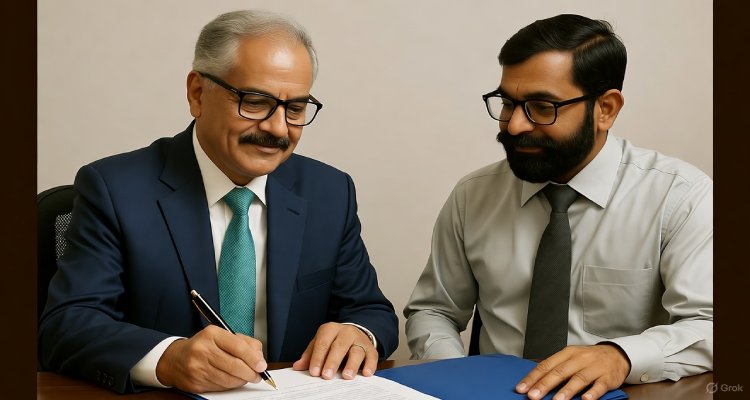NCB and Rashtriya Raksha University Join Forces to Tackle Drug Crimes in the Digital Era

The Narcotics Control Bureau and Rashtriya Raksha University have signed an MoU to strengthen India’s fight against drug trafficking, with a focus on darknet markets, crypto tracing, and cyber intelligence.
A Strategic Step Against India’s Growing Drug Menace
In a major push to strengthen India’s war on drugs, the Narcotics Control Bureau (NCB) and Rashtriya Raksha University (RRU) have inked a Memorandum of Understanding (MoU) aimed at enhancing national capacity to combat narcotics trafficking—especially in the digital realm. The collaboration promises a robust mix of research, technology, and training to address modern narcotics crimes, which increasingly rely on darknet networks and cryptocurrency channels.
A New Phase in the Fight Against Narcotics
India’s narcotics challenge has evolved dramatically over the past decade. From traditional drug smuggling routes to sophisticated cyber-enabled trafficking, the threat has become multi-dimensional. This MoU between NCB and RRU represents a strategic partnership that bridges enforcement and academia, enabling the development of new tools and methods to disrupt illicit drug operations.
According to NCB officials, the partnership will focus on:
- Joint research on darknet narcotics markets
- Cryptocurrency tracing to follow financial trails of drug deals
- Cyber-threat intelligence gathering and analysis
- Capacity building and specialized training programs for NCB officers
This marks a significant move toward integrating data-driven research with field intelligence, enhancing India’s readiness against global narcotics networks that exploit emerging technologies.
Inside the Agreement: Research Meets Enforcement
The Rashtriya Raksha University (RRU)—an Institution of National Importance established under the Rashtriya Raksha University Act, 2020—has been a leading center for academic and professional training in security, defense, and policing. Located in Gandhinagar, Gujarat, and spread over 230 acres, RRU fosters a multi-disciplinary ecosystem where national security professionals and researchers collaborate to address evolving threats.
Through this MoU, RRU will act as a research and knowledge partner, providing analytical frameworks, cyber expertise, and academic resources to assist NCB’s operational goals. In turn, NCB will offer real-world case studies and enforcement insights that can help shape academic training programs and research outputs at RRU.
“This partnership will help create a new generation of officers trained to fight digital-age narcotics crimes,” said an RRU faculty member involved in cybercrime research. “It’s about merging enforcement with innovation.”
NCB: India’s Frontline Agency Against Drug Trafficking
Established in March 1986 under the Narcotic Drugs and Psychotropic Substances (NDPS) Act, 1985, the Narcotics Control Bureau serves as India’s apex body for coordinating and enforcing anti-drug laws. Headquartered in New Delhi, the agency operates through seven regional offices—including Delhi, Mumbai, Kolkata, Amritsar, Ahmedabad, Chennai, and Guwahati—and 30 zonal units across the country.
Beyond domestic operations, the NCB also upholds India’s commitments to international treaties such as the UN Conventions of 1961, 1971, and 1988, which combat illicit drug trafficking globally. The agency’s recent focus has shifted toward technology-driven enforcement, targeting online marketplaces, encrypted communications, and digital payment systems used in drug transactions.
Why the Collaboration Matters
The digitalization of crime has blurred geographical boundaries, and drug trafficking is no exception. Criminal syndicates now use darknet marketplaces—hidden layers of the internet accessible through encryption tools—to trade drugs and launder money via cryptocurrencies like Bitcoin and Monero.
By collaborating with RRU, the NCB gains access to advanced academic research and technical training, vital for tracking encrypted data trails, identifying blockchain anomalies, and predicting trafficking trends. Meanwhile, RRU benefits by integrating real-time enforcement feedback into its curriculum, helping to prepare future cybercrime specialists and law enforcement experts.
Experts say this collaboration could serve as a model for other law enforcement partnerships in India, bridging the long-standing gap between theoretical research and field-level operations.
Public and Expert Reactions
Security analysts have hailed the move as a “timely intervention.”
“Drug trafficking networks are adapting faster than enforcement agencies,” says a senior criminologist. “By joining hands with a research-based institution like RRU, the NCB is future-proofing its intelligence and operational systems.”
Public reactions have also been largely positive, with many emphasizing the need for tech-savvy policing. Social media discussions have highlighted how similar collaborations worldwide—like between Europol and academic cyber labs—have already produced results in intercepting online drug trades.
Looking Ahead: The Road to a Drug-Free Digital India
This partnership represents a forward-looking model for integrating technology, research, and enforcement in India’s anti-narcotics framework. It signals a shift from reactive policing to predictive and data-led enforcement, a vital approach in the face of complex, globalized drug networks.
Future initiatives under the MoU may include:
- Setting up joint research labs focused on cyber-narcotics tracking.
- Publishing white papers on drug trends and darknet analytics.
- Launching training certifications for cyber investigators and law enforcement personnel.
If executed effectively, the collaboration could not only improve India’s capacity to curb narcotics crime but also position the country as a leader in global anti-drug intelligence.
Conclusion
The MoU between NCB and RRU stands as a pivotal moment in India’s ongoing fight against narcotics trafficking. By combining enforcement muscle with academic insight, it promises a smarter, faster, and more informed approach to dismantling the networks that threaten society. In the digital age, intelligence is the new weapon—and this partnership ensures India is well-armed.
Disclaimer: This article is for informational and educational purposes only. It does not represent the official views of any government agency or institution.









